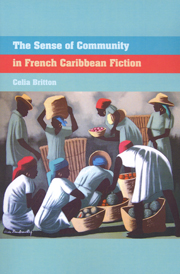Book contents
- Frontmatter
- Contents
- Acknowledgements
- Abbreviations
- Introduction
- 1 Restoring Lost Unity in Jacques Roumain's Gouverneurs de la rosée
- 2 Past, Future and the Maroon Community in Edouard Glissant's Le Quatrième Siècle
- 3 Living by Mistake: Individual and Community in Simone Schwarz-Bart's Pluie et vent sur Télumée Miracle
- 4 Singular Beings and Political Disorganization in Vincent Placoly's L'Eau-de-mort guildive
- 5 Conquering the Town: Stories and Myth in Patrick Chamoiseau's Texaco
- 6 Community, Nature and Solitude in Daniel Maximin's L'Ile et une nuit
- 7 On Not Belonging: Surrogate Families and Marginalized Communities in Maryse Condé's Desirada
- Conclusion
- Notes
- Bibliography
- Index
3 - Living by Mistake: Individual and Community in Simone Schwarz-Bart's Pluie et vent sur Télumée Miracle
- Frontmatter
- Contents
- Acknowledgements
- Abbreviations
- Introduction
- 1 Restoring Lost Unity in Jacques Roumain's Gouverneurs de la rosée
- 2 Past, Future and the Maroon Community in Edouard Glissant's Le Quatrième Siècle
- 3 Living by Mistake: Individual and Community in Simone Schwarz-Bart's Pluie et vent sur Télumée Miracle
- 4 Singular Beings and Political Disorganization in Vincent Placoly's L'Eau-de-mort guildive
- 5 Conquering the Town: Stories and Myth in Patrick Chamoiseau's Texaco
- 6 Community, Nature and Solitude in Daniel Maximin's L'Ile et une nuit
- 7 On Not Belonging: Surrogate Families and Marginalized Communities in Maryse Condé's Desirada
- Conclusion
- Notes
- Bibliography
- Index
Summary
When Pluie et vent sur Télumée Miracle came out in 1972, its portrayal of rural Antillean society was attacked by Marxist critics for being depoliticized and defeatist, for ignoring the social and historical determinants of the reality which it depicted as timeless and irremediable, and for presenting a heroine who was relatively privileged and alienated from the community of cane-cutters. Other critics later came to Schwarz-Bart's defence, notably Mireille Rosello, in an article first published in 1990, in which she argues that Télumée, far from being passive and resigned to her fate, embodies a specifically female type of resistance rejecting grandiose heroic gestures and martyrdom, and based instead on low-key tactics of day-to-day survival. These two opposed views, however, have in common an emphasis on the heroine as an individual, suffering and surviving on her own. Télumée's independence is indeed prominent throughout her narration. There are other individuals whom she loves and cares for, but she does little to help the community as a whole; towards the end of the text she acts as a healer for a short period of time, but does not attach much importance to this. Conversely, the community helps and supports her at times. But her dominant characteristic is her very strong sense of her individual identity – reinforced by her telling her story in the first person.
- Type
- Chapter
- Information
- The Sense of Community in French Caribbean Fiction , pp. 55 - 73Publisher: Liverpool University PressPrint publication year: 2010



